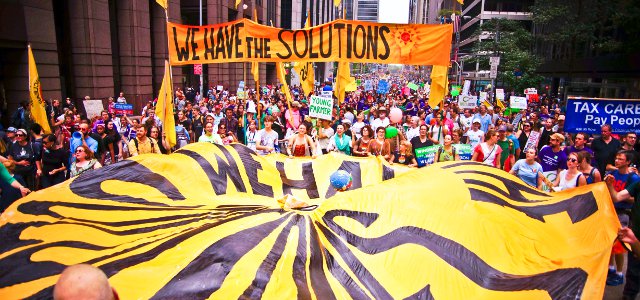While we keep burning harmful fossil fuels on an unimaginable scale, there’s also a number of good news: A growing number of communities around the world set themselves a goal of 100% renewables. What we need most are thus visionaries and political will, argues Stefan Schurig.

We have the solutions – but we need the political commitment to radically change our societies and economies. (Photo by Light Brigading, CC BY-NC 2.0)
Ready for some good news? Well, keep reading. I will get to it in a minute, but first, I must say that it is just not easy to be positive these days. We continue burning highly valuable resources such as oil and gas on an unimaginable scale. We keep heating up the planet despite the obvious devastating impacts of climate change. Many countries and regions are suffering from worsening pollution and most of the countries depending on oil and coal imports have no idea how to emancipate themselves from this resource dependency. We are degrading our natural environments at an unprecedented pace and neither our national politicians nor the United Nations seem capable of stopping it. So where is the good news?
Last month I had the chance to meet Dennis Meadows, who has been co-authoring eye-opening books about the limits to growth since 1972. Forty years later, his alarming predictions of resource depletion, biodiversity loss and environmental degradation as a consequence of human behavior have come true. But instead of being frustrated he is actually very positive about recent developments. Prof. Meadows is convinced that along with an ‘exponential growth of the problems’ there is an exponential growth of solutions, too. And that’s where the good news begins.
Across the world today we are observing a movement among local governments, nations, islands, businesses, communities and citizens towards 100% renewable energy (RE). In fact, the City of Vancouver has just joined this movement, proving again that political will can catalyze change. At a hugely inspiring Forum last week in Vancouver the mayor himself showed strong commitment to reach this target.
Worldwide since 2013, newly added capacity of renewable energy has outpaced that of oil, coal and gas combined. This is an important milestone for the global transformation towards an energy sector fully powered by renewable energy. Renewable energy has become extremely efficient – and, above all, they have become cheap. The question, therefore, is no longer ‘Will the world one day be entirely supplied with renewable energy?’ but rather ‘When?’ In fact, an increasing number of cities and regions have already embarked on that journey by setting the goal of 100% renewable energy; some have even reached the target already. The key to successful implementation is to share the benefits of decentralized and modern power generation throughout society by including citizens and communities in the process.
It would be an illusion to believe that simply fueling the same system with different resources will lead us in the right direction and keep the planet habitable for current and future generations. Instead, our societies and economies themselves must be transformed to ensure sustainable, secure and affordable access to energy for all. Vancouver has a proud history of being at the forefront of sustainability and is now yet again a pioneer: it is one of the first cities that joined the new 100% Renewable Energy network for local governments that was established by partners of the Global 100% RE Alliance, including ICLEI, World Future Council, deENet, World Wind Energy Association, Fraunhofer ISE and others. This initiative aims to strengthen understanding within local governments on what 100% RE means and how to reach it.
Copenhagen, San Francisco, Sydney, Frankfurt and many more places have already proven that the necessary technologies and knowledge exist. Frankfurt for example is well on track to shifting to 100% renewable electricity by 2050. The city has reduced emissions by 15% while its economy grew by 50%. Furthermore, with energy efficiency measures, Frankfurt has saved over €100 million in energy costs, a number that’s projected to rise. In Germany, 80 out of 140 communities and municipalities from a network of 100% RE regions have already reached their target. As much as I appreciate efforts to reduce a city’s carbon footprint, local government’s commitment to 100% renewable energy – such as the one only recently from Vancouver – makes, above all else, a lot of economic sense. It will lead to more sustainable jobs and it will help cities stay atop global green livable cities rankings. In this spirit I wholeheartedly agree with Deputy Mayor Andrea Reimer who said, “There’s a compelling moral imperative but also a fantastic economic case to be a green city.”
Being one of the early adopters of an unstoppable global transformation really pays off.
Stefan Schurig is the Climate Energy Director at the World Future Council. He is an architect by training, but devoted most of his career to energy and climate change issues. Before he started working for the World Future Council (WFC) in 2007 he was the spokesperson for Greenpeace in Germany and headed the Greenpeace Climate and Energy department for nine years. During this time he also co-founded Germany’s second largest green electricity supplier. In 2004 Schurig was appointed as member of the REALISE Forum, an international platform on renewable energy policies led by the European Commission
This article was first published at World Future Council and is reposted with permission.
Today i met a top government official regarding to sell him Islamic Energy fund.Which will be posting an expected return of 18 to 20% per annum.I try to convince him to invest in it but i was responded as exponential growth in alternative energy sources.Our research team has accessed that in future 5years crude oil will be traded at 80dollers.so due to this i need to study this topics.But input do not satisfy me,i need some extra knowledge if your excellency may provide.